#moths of india
Explore tagged Tumblr posts
Text

Nepita conferta Moth.
#nepita conferta#nepita conferta moth#nepita#moths of india#moths#moths of maharashtra#moth#insects of tumblr#insects of maharashtra#insects of india#insect#insects#lepidoptera#entomology#arthropod#arthropods
42 notes
·
View notes
Text


Indian Lily Moth (Polytela gloriosae), family Noctuidae, Odisha, India
photographs by Haraprasan Nayak
4K notes
·
View notes
Photo
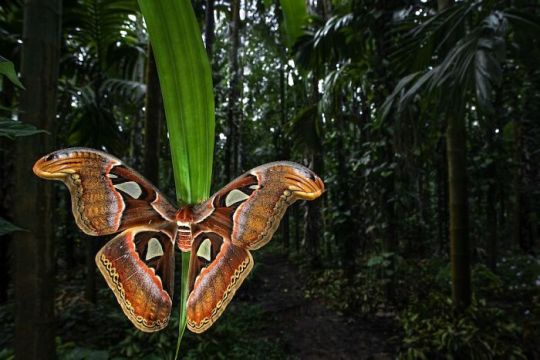
"Atlas Moth"
This beautiful Atlas moth (Attacus atlas) was found during my daily walk in our areca nut plantation in Sirsi, India
By Uday Hegde
Close-Up Photographer of the Year Awards
#uday hegde#photographer#close-up photographer of the year awards#atlas moth#moth#insect#attacus atlas#areca nut plantation#sirsi#india#nature
74 notes
·
View notes
Text

Inktober Day 13 'rise' Lucero being a cosmic moth again.
2 notes
·
View notes
Text

Meet one of the largest insects on the planet: the Atlas moth (Attacus atlas)! With a wingspan that can reach 10.6 in (27 cm), this giant can be found in parts of Asia including China, India, and Indonesia. As a caterpillar, the Atlas moth spends nearly every moment eating… but as an adult, it cannot feed because it has a non-functioning mouthpart—resulting in a lifespan of only up to two weeks. Did you know? You can spot this species up close in the Davis Family Butterfly Vivarium in the Museum's Richard Gilder Center for Science, Education, and Innovation! Plan your visit.
Photo: armbbb, CC BY-NC 4.0, iNaturalist
#science#nature#natural history#animals#insects#entomology#moths#butterfly#atlas moth#lepidoptera#did you know#fact of the day#cool animals
1K notes
·
View notes
Text
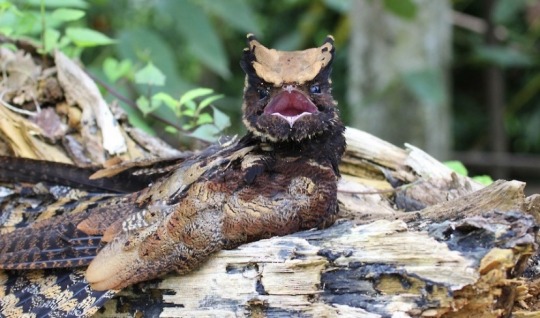


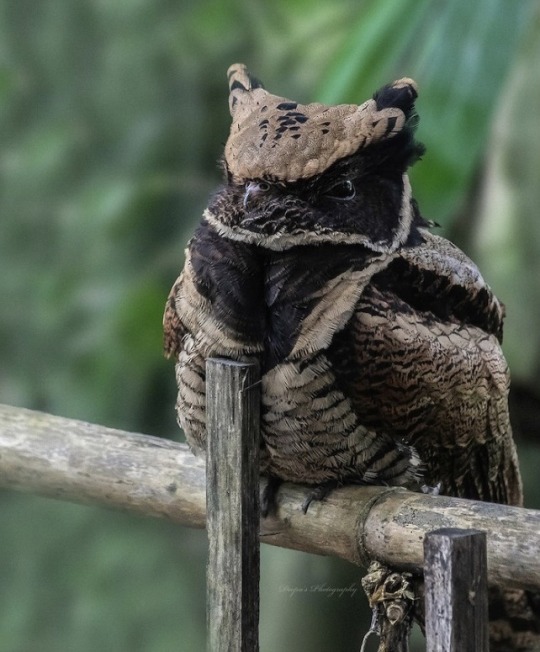


the great-eared nightjar is one of the largest nightjar species, found in southwestern india along with other portions of southern asia. they are discerned by their large, barred wings, small white throat patch, and pointed ‘ear’-shaped tufts. they prefer tropical and subtropical forest habitats. like other nightjars, they are active at dusk & night. they make an incredibly simple nest - a scrape on the ground - where they incubate a single egg per clutch. they feed almost entirely on insects caught in flight, primarily moths and beetles.
4K notes
·
View notes
Text
Moth Of The Day #255
Oriental Purple Owl-moth
Erebus albicinctus
From the erebidae family. They can be found in Taiwan, India, Nepal, Bangladesh, Thailand and Indonesia.
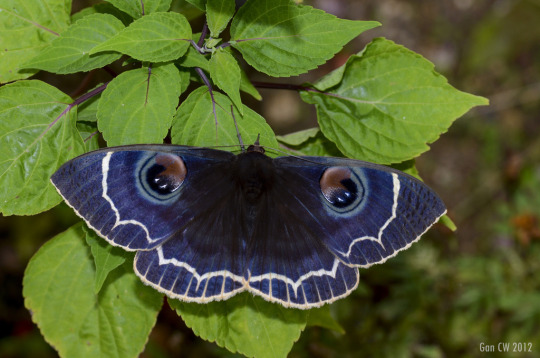
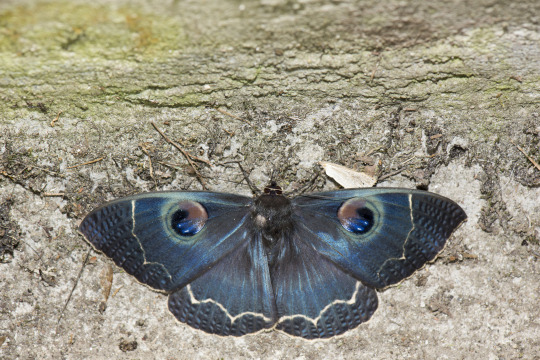
Image sources: [1] [2]
also it's my birthday hi
#moth#moths#lepidopterology#lepidoptera#nature#pretty moth#bugs#insect#moth of the day#motd#bug#lepidoptery#entomology#bugblr#lepidopterist#erebus albicinctus#oriental purple owl moth#oriental purple owl-moth#asian moth#beautiful moth
744 notes
·
View notes
Text
Macrocilix maia: these moths have a wing pattern that deters predators by mimicking a pair of flies gathered around a pile of bird droppings; the moth even emits a pungent odor to enhance the illusion

This species has developed a very unique defense mechanism -- its wings are decorated with elaborate markings that resemble two flies feeding on a pile of bird droppings.
There are many other moths that are known to mimic bird droppings, but the markings of this particular species are far more elaborate than the markings found on the other species, and the scene that it mimics is especially specific; the addition of the "flies" is also a unique touch, as is the odor that the moth emits.
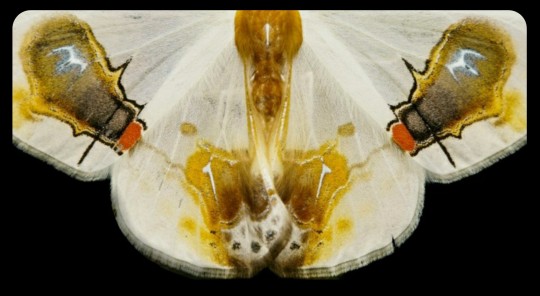
The markings even mimic the sheen of a fly's wings/exoskeleton by including squiggly patches of white at the back of each fly's thorax, and those white patches have a thin, blue outline that gives the flies a blackish-blue appearance (just like actual flies). There are white lines located in the rounded sections of the bird droppings, too, which mimics the glistening, convex appearance of dung.
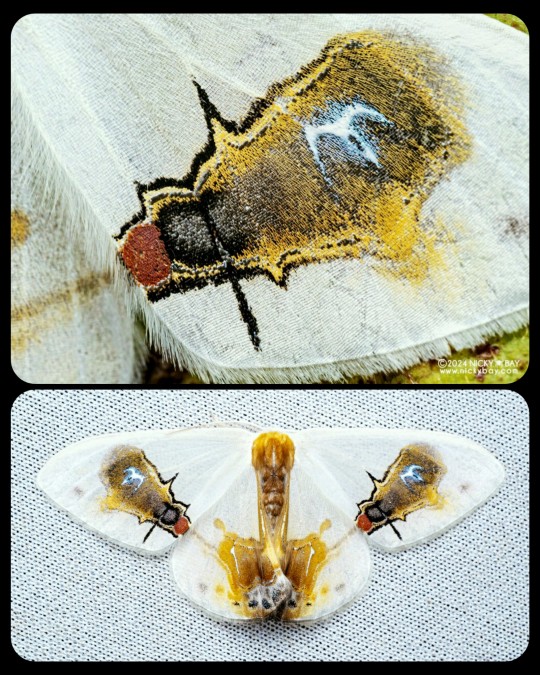
M. maia can be found in the forests/jungles of Borneo, Sumatra, Malaysia, India, Japan, Taiwan, China, and Korea.
Sources & More Info:
Moths of Borneo: M. maia
Moth Identification: Macrocilix maia Moth
Chien C. Lee Wildlife Photography: Fly-Mimic Moth
#lepidoptera#entomology#moths#macrocilix maia#fly-mimic moth#mimicry#animal camouflage#cool bugs#insects#animals#nature#evolution#animal facts#arthropods#weird animals
231 notes
·
View notes
Note
She walks in beauty, like the night
Scully in the simplest, blackest silk. Scully pale, moon-kissed, vulnerable. Scully’s hair and eyes like where the stars are born.
***
Scully comes to him when even the moon is all but asleep, like a single calla lily from a secret admirer. Unbidden. Unexpected.
Unparalleled.
“Mulder,” she says, outside his open door, in a negligee that last shade of sky blue before it goes pitch black.
Spaghetti straps and a low décolletage, though not shockingly low. Lace trim, mid thigh. It looks like something Katharine Hepburn would wear to slap you.
Not you. Him.
Specifically him.
She looks up at him through her heavy-lashed, heavy-lidded eyes.
He stares at her for his own sake because deep in his 12 year old heart, no one would ever, ever, believe that nerdy Fox Muld-
Scully takes another step closer onto the sad oatmeal carpet of his hotel room. She has such pretty ankles, she has such pretty calves. She smells like honeysuckle and hot bike tires and buttery lobster rolls and the sweetest, purest moments of his life.
She tips her face up to him, Agent Scully does, all eyes and lips and cheekbones like a geometric proof.
“God,” he says. And he means it.
***
LA belongs to the sun and Scully is a San Diego baby but he knows, he knows, she is an East Coast girl at heart. He knows she loves the first retinal purple-orange sunrises of America and the first sapphire kisses of night. He knows she loves the stars by which her father learned to navigate. He knows she loves the distant moon.
He knows she loves blue crabs and wool duffel coats and khaki shorts and aspires to East Hampton in her most secret, silent heart.
One day he will make love to her in London because she will, he knows, hark to the call of the City. She is a creature of old stone and lichen and liminal space.
She is the answer to Samson’s riddle.
***
He’d rented a jet black ‘57 Chevy Bel Air because Christ, this girl. Abductions and cancer and the most awful brutality and stolen ova and Christ; this brilliant, moonbeam girl.
She sees the car and she says nothing. But her eyes, her eyes. Her Star of India eyes.
Scully sees the car and she smiles, shy. Scully squeezes his hand.
***
He fucks her - hard, desperate - in the Chevy out over Mullholland and she cries out for him because even Saint Teresa writhed in ecstasy.
He kisses her the way a mariner kisses his homeland soil because she is his human credential. He kisses her like a Torah scroll. He shudders, murmurs I love you, I love you into the hot, sweet dark of her mouth.
***
She is bleeding, just a little. She is bleeding in the warm caress of a Southern California night. She is bleeding as though she were a virgin and maybe she is; maybe there is sex and there is fucking and there is making love and there is This.
Are you there, god? It’s me, Dana.
She touches his sleeping rosebud lips. She touches his funny nose and his beautiful jaw and she doesn’t say I love you aloud like he had because she’d learned it was shameful. She’d learned to salute.
But it’s 3 AM, neither properly morning nor properly night. It’s 3 AM and she isn’t LA pretty, not by a long shot, but she’s here with him, with Mulder, who is very LA pretty and has money besides.
She’s too short and too pale and her nose is patrician rather than cute and she gets burnt instead of tan. She doesn’t laugh in the right places at movies. She likes copper because it burns green, she likes moths more than butterflies, she can quote Jane Austen’s most acerbic lines.
She thinks of Mulder swimming hard across the Vineyard tides, Mulder with his cinnamon skin in the whipped cream breakers. Riding a red fixed-gear along Lake Tashmoo, tugging his tiny sister along. Mulder basking on the beach like a young god of summer. Mulder with his heart afire like Saint Margaret Mary Alacoque.
Her father is dead and look, look Mulder has such a tender soul even if he’s Jewish and atheist, Daddy. Mulder has eyes like fern moss.
“I love you,” she says, her eyes brimming with tears, her eyes bright as the newest stars.
129 notes
·
View notes
Text
Round 2 - Arthropoda - Insecta
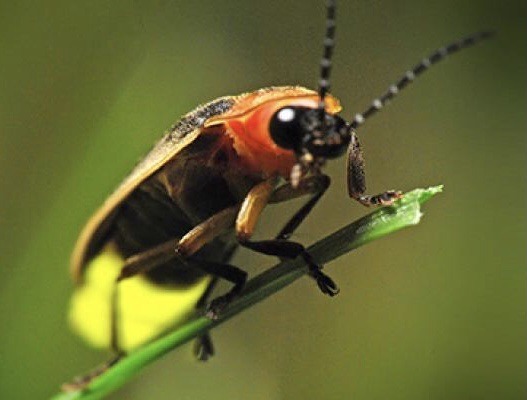
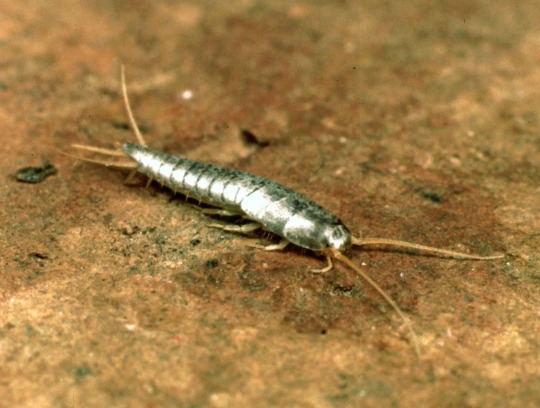
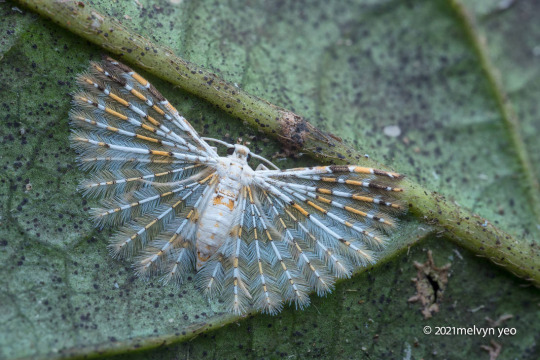
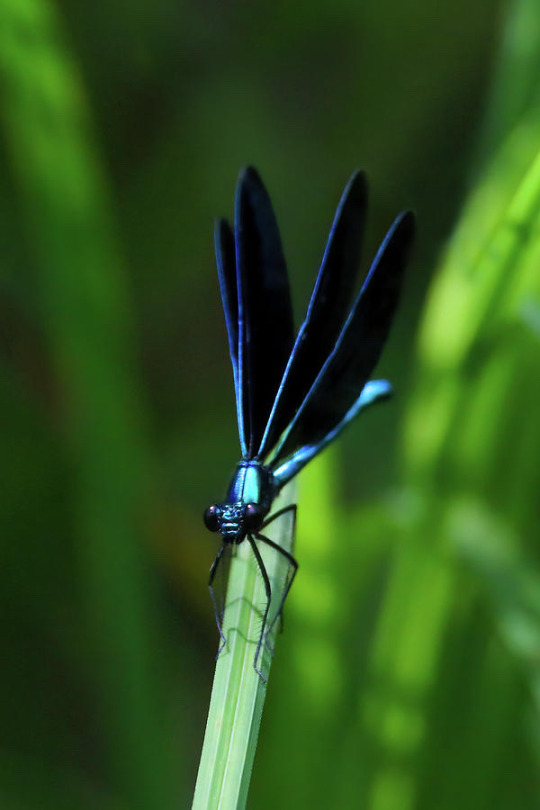
(Sources - 1, 2, 3, 4)
Our last athropods, the hexapod crustacean class Insecta, is one of the most successful groups of animal on earth. They are the most diverse, with over a million known species, comprising more than half of all eukaryote (animals, plants, fungi, etc) species, making them the “Default Animal.” They are comprised of three main groups: Archaeognatha (“Jumping Bristletails”), Zygentoma (“Silverfish” and “Firebrats”), and Pterygota (winged or secondarily wingless insects).
As hexapods, insects have a three-part body plan: head, thorax with 6 legs, and abdomen. They have compound eyes (some in addition to ocelli) and a pair of antennae. Many groups have 1-2 pairs of wings as adults. Insects have many means of perceiving the world: compound eyes and ocelli for seeing, tympanal organs for hearing, and receptors on the antennae and mouthparts for smelling. They live in almost every environment and occupy almost every niche. Many are aquatic, or have aquatic larvae. They are the first animals to have evolved flight. Some are solitary, some are social, some live in large, well-organized colonies. Some communicate with pheromones, some with sounds, some with bioluminescence. Some are venomous, some are poisonous. Most insects hatch from eggs, though some are birthed live. Some hatch as miniature adults, some go through a partial metamorphosis in which the larval stage looks vastly different from the adults, and some go through a complete metamorphosis in which a nearly immobile pupa is formed. Some insects provide maternal care. Some are carnivores, some herbivores, some omnivores, some parasites. Some spend most of their lives in their larval stage, and don’t even feed as adults. Due to the high diversity of insects, it would be impossible for me to summarize them further!
Fossil insects are known from the Paleozoic Era, during which they achieved large sizes, such as the giant dragonfly-like Meganeuropsis permiana, with an estimated wingspan of up to 710 millimetres (28 in), and a body length from head to tail of almost 430 millimetres (17 in).

Propaganda under the cut:
Insects are absolutely critical in all ecosystems, forming the base of the food chain, turning and aerating soil, controlling pests, encouraging or controlling the growth of plants, scavenging and recycling biological materials, and creating topsoil. Without insects, our planet would die.
There are many contenders for “largest insect.” The Giant Stick Insect (Phobaeticus serratipes) is the longest insect in the world, with specimens recorded at over 56 cm (22 inches), including their legs. The Giant Weta (Deinacrida heteracantha) is the heaviest, with a record of 2.5 ounces. Queen Alexandra’s Birdwing (Ornithoptera alexandrae) has the largest wingspan, which reaches up to 30 cm (1 foot) wide.
Meanwhile, the smallest known adult insect is a parasitic wasp, Dicopomorpha echmepterygis, commonly called “Fairyflies”. Males are wingless, blind and measure only 0.127 mm long.
Many insects are popular pets, including various species of mantis, cockroach, beetle, moth, and ant! Some are even domesticated, including silk moths and honeybees.
Many insects are eaten by humans, and farming insects for food is considered more sustainable than farming large chordates. These farmed arthropods are referred to as “minilivestock.”
Shellac is a resin secreted by the female Lac Bug (Kerria lacca) on trees in the forests of India and Thailand. It is used as a brush-on colorant, food glaze, natural primer, sanding sealant, tannin-blocker, odour-blocker, stain, and high-gloss varnish. It was once used in electrical applications as an insulator, and was used to make phonograph and gramophone records until it was replaced by vinyl.
One of the biggest ecosystem services insects provide for humans is pollination. Crops where pollinator insects are essential include brazil nuts, cocoa beans, and fruits including kiwi, melons, and pumpkins. Crops where pollinator insects provide 40-90% of pollination include avocados, nuts like cashews and almonds, and fruits like apples, apricots, blueberries, cherries, mangoes, peaches, plums, pears, and raspberries. In crops where pollinators are not essential they still increase production and yield. Important pollinators include bees, flies, wasps, butterflies, and moths.
Many insects are sacred to humans. In Ancient Egypt, scarab beetles were used in art, religious ceremonies, and funerary practices, and were represented by the god Khepri. Bees supposedly grew from the tears of the sun god Ra, spilled across the desert sand. The Kalahari Desert's San People tell of a legendary hero, Mantis, who asked a bee to guide him to find the purpose of life. When the bee became weary from their search, he left the mantis on a floating flower, and planted a seed within him before passing from his exhaustion. The first human was born from this seed. Dragonflies symbolize pure water in Navajo tradition. In an Ancient Greek hymn, Eos, the goddess of the dawn, requests of Zeus to let her lover Tithonus live forever as an immortal. Tithonus became immortal, but not ageless, and eventually became so small, old, and shriveled that he turned into the first cicada. Another hymn sings of the Thriae, a trinity of Aegean bee nymphs. Native Athenians wore golden grasshopper brooches to symbolize that they were of pure, Athenian lineage. In an Ancient Sumerian poem, a fly helps the goddess Inanna when her husband Dumuzid is being chased by galla demons. In Japanese culture, butterflies carry many meanings, from being the souls of humans to symbols of youth to guides into the afterlife. Ancient Romans also believed that butterflies were the souls of the dead. Some of the Nagas of Manipur claim ancestry from a butterfly. Many cultures use the butterfly as a symbol of rebirth. And the list goes on…
#sorry I had to copy paste some propaganda from the Arthropoda poll I’m tired and it’s A Lot#anyway Chordata tomorrow!#round 2#arthropoda#animal polls#insecta
78 notes
·
View notes
Text
Mushroom of the day:
Caterpillar fungus/Ophiocordyceps sinensis
Growing location: China, Nepal, India, Bhutan on the Tibetan plateau and the Himalayas; growing location: parasitizes Caterpillars of the ghost moth at about 11,000 feet above sea level
Characteristics: brown, like mushroom grows out of the head of a ghost moth caterpillar
 Rarest, and most expensive mushroom in the world 



78 notes
·
View notes
Text



Nepita conferta Moth.
#nepita conferta#nepita conferta moth#nepita#moth#moths of india#moths of maharashtra#moths#insects of tumblr#insect#insects#insects of maharashtra#insects of india#lepidoptera#entomology#arthropod#arthropods
27 notes
·
View notes
Text
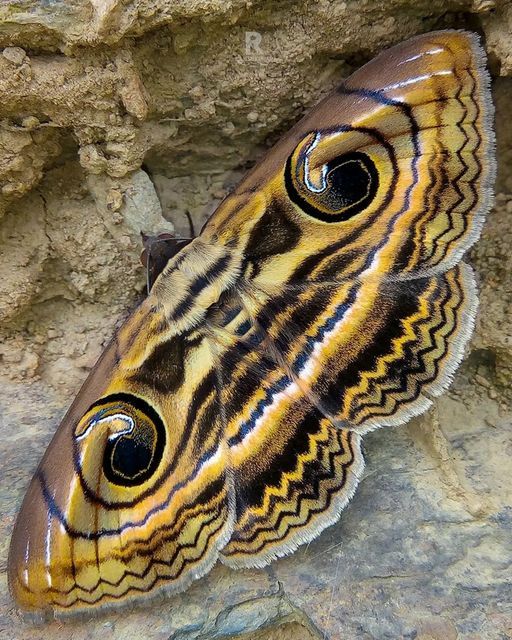
Indian Owlet Moth (Spirama retorta), family Erebidae, India
photograph by rajesh kumar (@rajesh_kumar_photography)
2K notes
·
View notes
Text
Pyrops delessertii and Pyrops maculatus, two lanternflies from India and Sri Lanka


There isn't really a consensus on whether this is one or two distinct species, but the yellow-spot form is only found in India and the frosty form is specific to Sri Lanka. Drawing both made me appreciate some of the subtler differences as well :]
Relatedly, a question I get a lot is "will you draw include multiple variations of dimorphic species?", and while I think the scope of that challenge is very large for one girl to do (this entire project as it is is already a lot!), I think it would be very cool to include some, especially when the dimorphism is very great or interesting. And also, I think everybody would enjoy a 1/1000 chance of finding a pink katydid or a bilateral gynandromorph moth :]
#art#bugs#pixel art#artists on tumblr#insects#tumblr art#pixel graphics#art comms open#game dev#indie Dev#bug blog#bugblr#bug game#hemiptera#fulgoridae#lanternfly
36 notes
·
View notes
Text

Monkey Apple
(glochidion littorale)
Also known as ubah, jambu kera, selunsor, hujan panas or daun san sik
Not to be confused with pond apple (annona glabra), which also has the nickname monkey apple.
Monkey apple can be found in southern India, Sri Lanka, Thailand, Cambodia, Vietnam, Malaysia, Indonesia and the Philippines. The plant can grow up to 10 meters tall and is often found in poor, sandy soils. While currently still under the glochidion genus, it has been proposed for merging into the phyllantus genus along with a few other genera. It is unique in that its pollination mechanism involves a symbiotic relationship with moths of the genus epicephala. The fruits should be eaten with caution for that reason as they can contain moth larvae. I couldn't find any information on what the fruit tastes like, only that it is sometimes eaten.
🍈 Reblog to share a fun fruit and to increase sample size! Check out even more interesting fruits here or in the list of all polled fruits. 🍈
29 notes
·
View notes
Text

Dubbed "The most interesting moth in the world," the incredible Picasso moth (Baorisa hieroglyphica) is a rare beauty found in India and Asia.
Click the link below to explore! https://bit.ly/3NMVXVN
[📸 msone]
153 notes
·
View notes